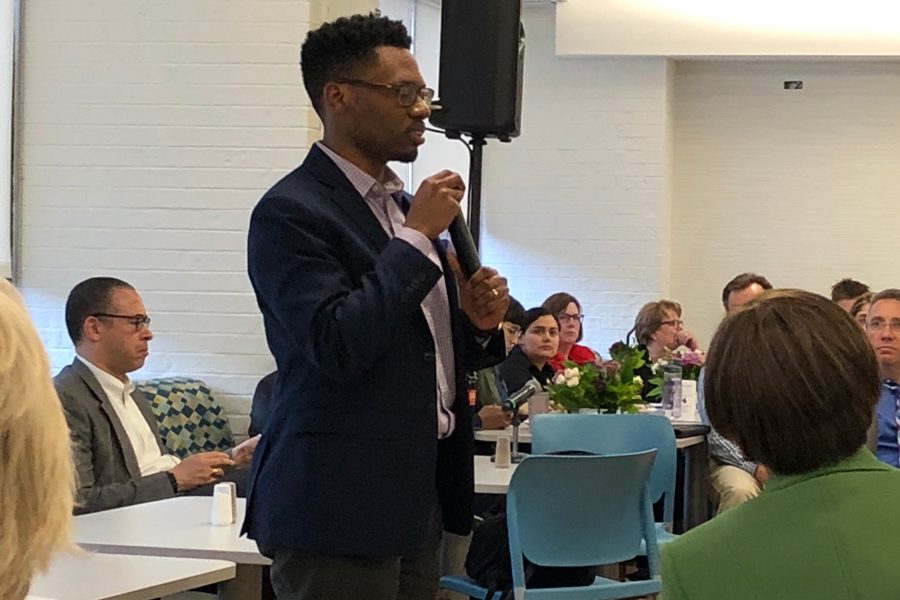Dining transition, tuition increase, Latinx Asian American Collective discussed at community dialogue
Gabby Birenbaum/The Daily Northwestern
Director of Social Justice Education Robert Brown speaks at Foster-Walker Complex. Brown facilitated conversation at the community dialogue, a quarterly event in which administrators address student questions.
April 30, 2018
Students, faculty and administrators discussed the University’s new dining contract, tuition increases and the Latinx Asian American Collective, among other topics, at a community dialogue in Foster-Walker Complex on Monday.
Robert Brown, the director of Social Justice Education, facilitated the dialogue, titled “Tell Us What’s on Your Mind — We’re Listening!” Vice president for student affairs Patricia Telles-Irvin said the title was intentionally left ambiguous in response to student feedback from previous dialogues, which are held quarterly.
Many students asked questions regarding Northwestern’s transition from contracting with Sodexo and Aramark to Compass Group North America for residential dining services. Jim Roberts, the senior executive director of division services who is overseeing the transition, provided an update on negotiations between Compass and the current Sodexo and Aramark employees.
“Compass is negotiating with the union that represents the employees,” Roberts said. “They have a great relationship with that union. We expect in a couple weeks we’ll see a successful negotiation.”
Vice president for human resources Pam Beemer responded to questions regarding the use of E-Verify for service workers such as Sodexo and Aramark employees. E-Verify — a service that matches information provided by employees on Form I-9 against government information on their immigration status and subsequent employment eligibility — is currently used in hiring by the University, Beemer said. She said her department is reviewing whether it is necessary to continue to do so for positions that are not supported with federal funding.
Beemer said Compass Group, as a separate agent, will have to make its own decision on the use of E-Verify.
“It’s their business decision and we are in conversations with them about what they are going to require, recognizing that we want to do all that we can to make sure that those people who we care about deeply are treated properly in that process,” Beemer said.
However, Roberts said it would be difficult for the University to “apply pressure” on Compass Group to abstain from using e-Verify, considering NU does use it.
After that discussion, Provost Jonathan Holloway addressed questions about this year’s 3.6 percent tuition increase. Weinberg sophomore Henry Molnar asked what justified the continual raising of tuition and if students should expect a yearly tuition hike.
Holloway said tuition increases are common among NU’s peer institutions. He said fewer than half of students pay full tuition, and Northwestern’s commitment to financial aid and increasing the number of Pell Grant-eligible students necessitates tuition increases for those who pay full price.
“We don’t want to be the most expensive school, (but) we don’t want to leave money on the table either,” Holloway said. “To hold tuition flat when the cost of running the University keeps going up naturally seems unreasonable to me.”
Finally, Holloway answered questions on the administration’s support and timeline for the departmentalization of the Latina and Latino Studies and Asian American Studies programs.
Holloway said he is an ally to the Latinx Asian American Collective, a student group that has been advocating for the departmentalization. He said before the process of “greenlighting” the departments can start — which, he added, will be a lengthy task — issues regarding faculty size have to be addressed.
He said there has to be a “critical mass” of faculty to ensure the department does not collapse from being too small. Holloway also said faculty of color and female faculty are often asked to do more than others, and he does not want them to be “taxed for doing the right thing.” He emphasized that the administration supports the validity of the programs.
“The issue for me is not about (if) I think these areas are ‘legitimate’ enough to deserve that kind of important scholarly distinction (of) departmental status,” Holloway said. “I think they are. My interest is trying to make sure that they’re done in the right way so that the students and the faculty aren’t suffering as a result of the best of intentions.”
Email: [email protected]
Twitter: @birenbomb


